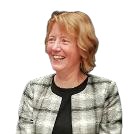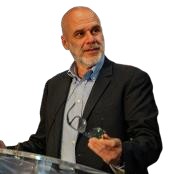No net land take in simple words
Marjan van Herwijnen and Nikos Lampropoulos, ESPON EGTC

Marjan van Herwijnen

Nikos Lampropoulos
This TerritoriALL focuses on the concept of “no land take objective” and “sustainable land use”. We asked the ESPON Research and Policy Manager, Marjan Van Herwijnen to help us explain those terms in simple words.
Marjan, what is the no land take objective and why is it important ?
This objective aims to ensure that there is in principle no land taken after 2050 that the soil and the land is going to get in a better condition for ecological functions, for biodiversity, for nature and also for agriculture.
So if for example we want to build a new road, we cannot do it anymore?
You can do it, but you need to ensure that another part of the land is given back. So to construct a road, we can dismantle an industrial area that is not being used anymore and return the soil in a such a condition that nature can be restored in that area. But as definitions on what exactly land take is, vary among member states, we need to create a common European approach.
What is the ESPON doing about this?
Currently ESPON supports the Belgian Presidency with a number of initiatives such as the present issue of TerritoriALL magazine. We are also developing a new policy paper on ‘No net land take – policies and practices in European regions’. This paper will address some key policy questions on the topic such as the tools, the policies, the obstacles and the proposed solutions to ensure an effective implementation of the “no net land take” objective.
Do we have ot her ESPON projects that provided evidence about sustainable land use?
A flagship ESPON project, SUPER, provides an overview of land-use changes in Europe since the year 2000. It has also developed an overview of over 230 interventions and their impacts on urbanisation.
The project resulted into a useful guide to sustainable urbanization and land use, providing the pros and cons of different modes of urbanization. Also two spin off projects were carried out about sustainable urbanization and land-use practices in Croatia and Lithuania.
ESPON resources on no net land take topic
Projects:
SUPER - Sustainable Urbanization and land-use Practices in European Regions
Case study Lithuania - Sustainable Urbanization and Land-use Practices
Case study Croatia - Sustainable Urbanization and Land-use Practices
EU-LUPA - European Land Use Patterns
Events including presentations
Online Workshop: Sustainable urbanisation strategies in the Netherlands (post event brief and presentations)
Peer Learning Workshop: How to reach no net land take by 2050 (post event brief and presentations)
Articles in other TerritorriALL editions:
Measuring the climate impact of spatial planning [TerritoriALL 3 - June 2021]
Promoting sustainable urbanization and land use in your region [TerritoriALL 5 - November 2021]
European challenges at the heart of renewed territorial planning [TerritoriALL 6 - June 2022]
Development of urban use in % of land area